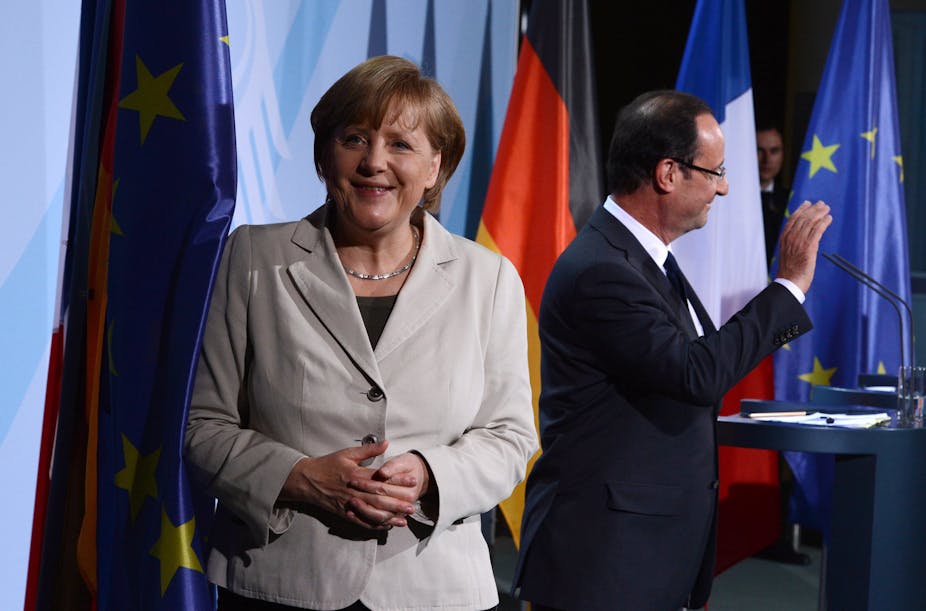Europe is in economic dire straits and the two most powerful economies on the continent are, at least on paper, led by individuals with considerable differences.
The previous French President Nicolas Sarkozy was not merely regarded as a man of austerity, but a man who Chancellor Angela Merkel could do business with.
The Sarkozy-Merkel imprint marks the entire bailout strategy that is now being employed against the Greeks. It is a model that has ushered in technocratic governments whose loyalties lie less to the citizen than the budget. Balancing accounts and paying creditors is considered the noble thing to do. Sovereign interests come second.
The search for common ground
Greek efforts to form a government have so far failed, and the Germans are getting agitated. High on the list of points to be discussed between the freshly elected François Hollande and Merkel in their first meeting will be adopting a unified stance on rectifying the problem. The issue is how far Merkel will budge, and how far Hollande is happy to yield to Berlin’s hardline approach.
Before audiences, and before the electorate, Hollande has adopted a stance that flies in the face of Merkel’s harsh program of economic medicine and no-frills accounting. On French television, when asked what gifts he would be taking to Berlin, his response was general: “The gift of growth, jobs and economic activity.” This on its own says nothing, and nor is it designed to. Hollande is confident, and is carrying a powerful baggage of sentiments with him.
Hollande’s party spokesman Benoît Hamon has given a clue on Hollande’s position. After complaining that Europeans were simply not buying anything any more, Hamon explained that Merkel’s primacy, and that of Germany in Europe, had to be stood up to. “We didn’t have an election to get a European president called Mrs Merkel who has the power to decide everyone else’s fate,” he said.
Scratch the surface further, and the unpopularity of the German position becomes clearer. The meeting will be a tense one.
Growth is the solution - but how
On the face of it, Hollande’s position mirrors that of the Syriza party in Greece – one can hardly repay a debt when there is nothing to draw upon. Accounts can hardly be balanced in times of economic contraction. Growth is the mandatory prerequisite, though how that growth will be feasibly achieved is a difficult prospect. France has better prospects in this area.
Merkel may be facing a revolt at home, despite polls in Germany saying that as many as 61% of Germans approve of her austerity stance. For one, the finger is being pointed in her direction, notably amongst members of the Social Democratic Party (SPD), that Greek nationalist extremism is due, in part, to her refusal to bend.
The emergence of a neo-Nazi movement in Greece has German voters concerned. Harsh economics often engender extreme politics.
The move away from austerity
Germany’s most populous state, North Rhine-Westphalia, returned the Hannelore Kraft led SPD-Greens to power in a thumping result this week, suggesting that the austerity brand is losing its appeal amongst local German voters. The Christian Democrats, led by Merkel’s environment minister Norbert Röttgen, barely had a look in, getting their worst result since 1949 in securing a mere 26% of the vote.
This follows defeat for them in the state of Schleswig-Holstein. Attempts to label the SPD-Green coalition as a “pro-debt” party did little to turn voters away.
With considerable effect, government campaigners have sought to underline the poor level of investment in parts of Germany. The emphasis, at least at the state level, is growth rather than belt tightening, notably in depressed areas.
Disagreement does not mean a Franco-German break up
The anti-austerity platform Hollande embraced was largely an anti-Sarkozy one: electorally expedient, necessary to distinguish himself from a deeply unpopular opponent. But populism doesn’t necessarily translate into coherent policy. That reflects an anti-German position is making too strong a contention.
Both Merkel and Hollande have made it clear that balancing the books is a priority for both their governments, though their means may differ at points.
The Greeks will be wondering whether the French-German position will fracture. That said, disunion will be avoided, though each leader will have a different audience to pander to.

